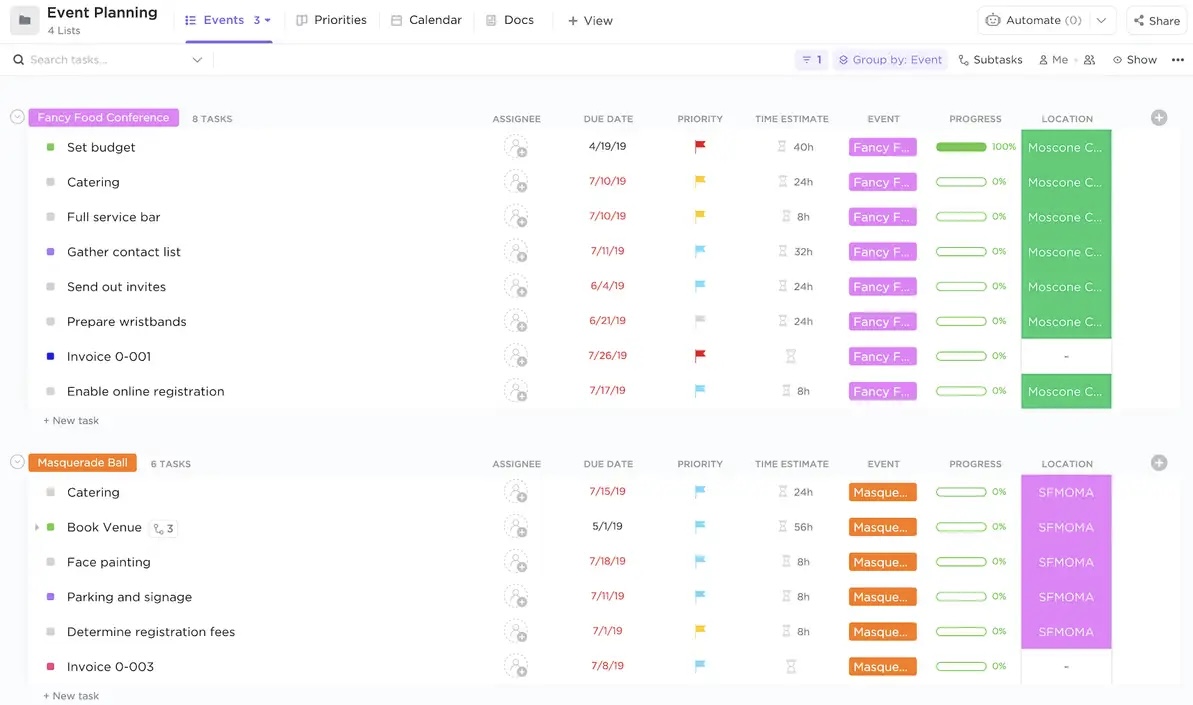You’ve got the perfect plan, the vendors are locked in, and for once, everything seems to be running smoothly—until the keynote speaker gets stuck in traffic, the caterer brings the wrong order, and someone asks if you can ‘just move the stage a little.’
Event planning keeps you on your toes, but event project management ensures you don’t end up in a panic spiral.
The right tools and strategies help you stay ahead of last-minute chaos, keep your team in sync, and make sure everything comes together (without losing your mind in the process).
This blog post is packed with tips, tools, and strategies to help you plan smarter and stress less. Let’s get started! 🎯
- What Is Event Project Management?
- When to Use Event Project Management?
- Essential Steps for Successful Event Project Management
- Step #1: Define objectives
- Step #2: Allocate budget
- Step #3: Develop a detailed timeline
- Step #4: Choose the right venue and manage logistics
- Step #5: Secure and coordinate vendors
- Step #6: Develop a marketing and promotion strategy
- Step #7: Execute the event with precision
- Step #8: Conduct a post-event review
- Implementing Event Project Management Software
- Major Risks of Poor Event Project Management
- Event Project Management Best Practices
⏰ 60-Second Summary
Event project management streamlines planning, execution, and coordination to ensure seamless event delivery. Here’s how to stay organized and in control:
- Define objectives: Set clear, measurable goals to guide event planning
- Manage budgets: Track expenses, vendor costs, and contingency funds
- Create a detailed timeline: Break tasks into phases, from planning to post-event follow-ups
- Coordinate vendors and logistics: Keep communication clear and track deadlines
- Market effectively: Use email, social media, and partnerships to boost attendance
- Ensure flawless execution: Create schedules and contingency plans to prevent disruptions
- Gather post-event feedback: Review insights and improve for future events
ClickUp offers an event management software with:
- ClickUp Tasks: Organize tasks, timelines, and vendor coordination in one place
- ClickUp Chat: Keep communication centralized with real-time updates and discussions
- ClickUp Dashboards: Track budgets, timelines, and event progress with customizable reports
- ClickUp Automations: Streamline task assignments, reminders, and approvals
- ClickUp templates: Pre-built event planning workflows for fast and efficient setup
What Is Event Project Management?
Event project management is the strategic planning and execution of events, ensuring that every detail aligns with the overall objectives. It involves defining the event’s scope, setting clear goals, and coordinating every detail—from budgeting and scheduling to resource allocation and risk management.
Difference between general project management and event project management
Unlike general project management, which may address ongoing processes or long-term initiatives, event project management is inherently temporary and dynamic, focusing on delivering a memorable experience within a fixed timeframe.
One key difference is the level of unpredictability. Events require real-time problem-solving, contingency planning, and adapting to last-minute changes, such as vendor cancellations or unexpected weather conditions.
This specialized discipline requires seamless collaboration among internal teams, external vendors, stakeholders, and sponsors to ensure each element aligns with the event’s goals.
With strict budgets, unpredictable logistics, and last-minute changes, event project managers rely on agile planning and innovative technologies for registration, attendee tracking, and real-time feedback.
🧠 Fun Fact: Enthuaistic historians often consider the first documented ‘event planner’ to be Queen Cleopatra, who organized elaborate feasts and celebrations in ancient Egypt.
When to Use Event Project Management?
Think planning an event is as simple as picking a venue and sending invites? Not quite. Event project management steps in when juggling tasks, timelines, and teams gets serious.
Let’s break down when to put it to work. 💼
📌 Large or complex events
When an event involves multiple stakeholders, vendors, and logistics, coordination becomes critical. Multi-day conferences, music festivals, and large fundraisers require detailed scheduling, team collaboration, and risk management to keep everything on track.
With significant budgets and numerous elements, a structured plan ensures financial oversight and smooth execution.
📌 Tight deadlines and fixed dates
Some events—like product launches, trade shows, and weddings—have non-negotiable deadlines. There’s no room for delays, and any misstep could lead to financial loss or reputational damage.
In these high-pressure situations, project management keeps tasks on schedule, ensuring everything is ready when the big day arrives.
📌 Resource-heavy events
Planning an event with extensive logistics, such as catering, audio-visual setup, transportation, or stage production, requires careful coordination. Budget tracking is also crucial to prevent overspending.
From managing sponsorships to vendor contracts, an organized approach ensures every resource is accounted for and used efficiently.
📌 High guest or attendee count
For planning virtual conferences and public events like concerts, guest experience is just as crucial as logistics. Managing RSVPs, ticketing, and seating arrangements requires a clear system, while security, accessibility, and crowd control must be planned in advance. Without a structured process, large gatherings can quickly become chaotic.
📌 Corporate events
Business events—like leadership summits, company-wide meetings, and brand activations—demand structured agendas and cross-functional coordination. These events often involve internal teams, external partners, and post-event analysis to measure success.
📌 Events with custom or creative elements
Themed events, galas, and interactive experiences require meticulous attention to detail.
Every element must align with a clear vision, including decor, entertainment, and hybrid digital-in-person experiences. Event project management ensures creative concepts—whether reflecting a brand identity or personal style—are executed flawlessly.
🔍 Did You Know? The events industry is projected to reach $2.5 trillion by 2035, growing at a CAGR of 6.8% from 2024 to 2035.
Essential Steps for Successful Event Project Management
The event planning process can feel like a lot, but it doesn’t have to be overwhelming. Focus on a few essential steps, and you’ll be ready to organize an event that runs smoothly. 📝
Step #1: Define objectives
A successful event starts with well-defined objectives that align with your organization’s goals. Without clear direction, your planning efforts may lack focus.
Use SMART goals (Specific, Measurable, Achievable, Relevant, Time-bound) to create precise objectives.
For instance, instead of setting a vague goal like ‘increase engagement,’ set a measurable target like ‘increase newsletter subscribers by 30% among attendees within a month post-event.’
🧠 Fun Fact: The term ‘event planner’ gained mainstream popularity after the movie The Wedding Planner, but historically, royal courtiers handled event planning for kings and queens.
Step #2: Allocate budget
A well-planned budget ensures financial control and prevents overspending.
Here’s how to create one so your event runs smoothly:
- Identify all costs: Account for venue rental, catering, event marketing, technology, personnel, logistics, and unexpected expenses
- Get vendor quotes: Compare pricing for different venues, technology providers, and promotional campaigns to stay cost-effective
- Set a contingency fund: Allocate 10-15% of your budget for unforeseen expenses like last-minute equipment needs or additional staffing
Step #3: Develop a detailed timeline
A structured timeline keeps the project on track and ensures every task is completed on time. You can break the event into phases like pre-planning, promotion, vendor coordination, execution, and post-event activities.
Assign deadlines to each phase:
- Pre-planning: 3-12 months before
- Vendor finalization: 3-4 months before
- Marketing: Starts as soon as the event date is confirmed
- Execution: Week of the event
- Post-event: One week after the event
For example, a product launch event might require venue booking six months in advance, while a corporate networking event could finalize logistics within three months.
💡 Pro Tip: Always conduct a site visit to identify potential crowd flow issues and discuss setup requirements with venue staff.
Step #4: Choose the right venue and manage logistics
Your venue sets the tone for your event and must align with its objectives. Consider using venue management software to simplify scheduling, track availability, and optimize space based on audience size and event type.
For instance, a corporate seminar requires a professional setting, while a product launch may need a more interactive space.
Consider these key questions before making a decision:
- What amenities (WiFi, AV equipment, in-house catering, etc.) are available?
- How do these amenities affect your budget and guest experience?
- Is the venue accessible by public transport?
- Does it offer enough parking for attendees?
🔍 Did You Know? While venue responsiveness has improved, 47% of planners cite high costs as their top frustration, leading to shorter events, alternative destinations, and reduced activities.
Step #5: Secure and coordinate vendors
Vendors play a critical role in bringing your event to life, so choosing the right ones is essential.
For example, if you’re organizing a product launch, you’ll likely need a catering team, an AV provider for sound and visuals, and a photographer to capture the event.
Once you’ve finalized your needs, research vendors with a track record of reliability. Compare quotes, check reviews, and confirm availability to make an informed decision.
After selecting your vendors, maintain clear communication to confirm timelines, delivery schedules, and specific requirements. Create a detailed event planning checklist to track tasks like signing contracts, confirming payment terms, and sharing event details.
Staying organized ensures all vendors are aligned and ready to deliver on the big day.
💡 Pro Tip: Check in frequently with vendors to confirm deadlines and address last-minute changes.
Step #6: Develop a marketing and promotion strategy
A well-executed marketing plan enhances event attendance and engagement. Use social media to share teaser videos, behind-the-scenes content, and speaker interviews to build excitement. You can also collaborate with influencers or industry leaders to expand your reach.
For instance, a conference might offer early bird registration discounts through an email campaign to encourage early sign-ups.
Step #7: Execute the event with precision
Flawless on-site execution ensures a professional and smooth event experience. Create a minute-by-minute schedule detailing staff responsibilities, session start times, and contingency plans.
Always have a backup plan for speaker cancellations, technical failures, or logistical delays. Keep communication channels open using walkie-talkies or messaging apps to coordinate staff in real time.
🧠 Fun Fact: 80.4% of event managers say in-person events are their organization’s most impactful marketing channel.
Step #8: Conduct a post-event review
After the event, take time to review what went well and what could be improved. Gather your team to discuss successes and challenges and collect insights through event feedback surveys or social media polls.
For example, if guests find networking areas too crowded, consider adjusting the venue layout for future events. Use these insights to refine and scale your process, documenting best practices for future teams.
Continuously update your approach based on feedback and industry trends to ensure each event is better than the last.
📖 Also Read: How to Use AI for Event Planning
Implementing Event Project Management Software
Project management software for events streamlines every aspect of planning and executing events. It centralizes tasks, timelines, communication, and reporting so you can focus on delivering a memorable experience.
One standout solution in this space is ClickUp.
It is the everything app for work that combines project management, knowledge management, and communication—all powered by AI that helps you work faster and smarter.
With the ClickUp Event Planning Software, you can manage tasks, timelines, budgets, and communications all in one place, ensuring a cohesive planning process.
Here are some of its key functionalities. 😍
Organize tasks and timelines with ClickUp Tasks
ClickUp Tasks helps event managers break down every detail into clear, trackable action items.
Each task can include a description, assignees, due dates, attachments, and comments, making collaboration seamless. Subtasks allow for smaller steps within a task, ensuring nothing gets overlooked.
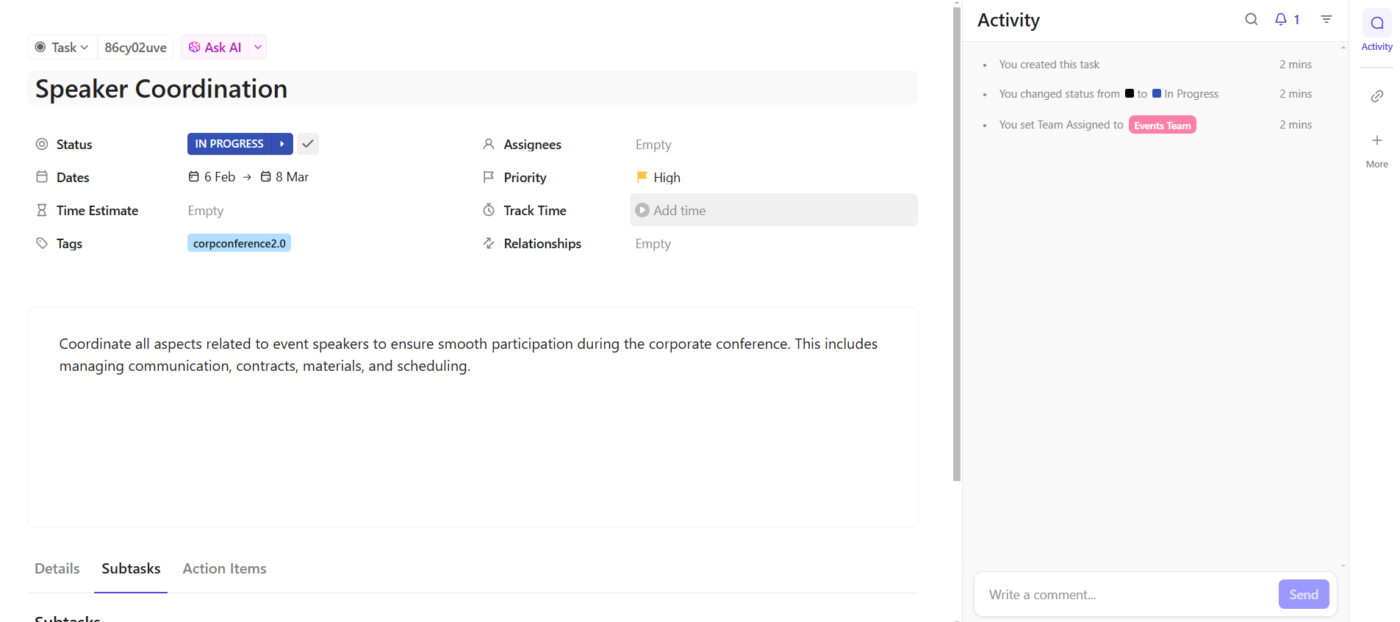
For example, when planning a corporate conference, you can create a ClickUp List for each event stage—venue booking, speaker coordination, marketing, and logistics. Within the ‘Speaker Coordination’ task, subtasks can include reaching out to speakers, finalizing contracts, gathering presentation materials, and scheduling tech rehearsals.
ClickUp Event Planning Template
To get started, you can leverage the ClickUp Event Planning Template to manage every detail—from venue selection and budgeting to guest lists and attendance tracking—in one place.
This template includes three highly intuitive, drag-and-drop ClickUp Views for efficient planning:
- List View: Organize event details, resources, and budgets in a structured format
- Board View: Track priorities and workflows with an intuitive Kanban-style board
- Calendar View: Manage event timelines and deadlines with a flexible calendar
Additionally, pre-saved Lists for Activities, Facilities, Pre-event, and Billing help categorize tasks and maintain a clear overview of your event’s progress.
Enhance collaboration through ClickUp Chat
Slack and other chat tools changed how teams communicate, making instant collaboration the norm. But over time, they became overwhelming, with endless notifications and scattered conversations pulling focus away from actual work.
Event planning teams know this all too well—managing constant chats while trying to stay on top of tasks can feel like a losing battle.
ClickUp Chat
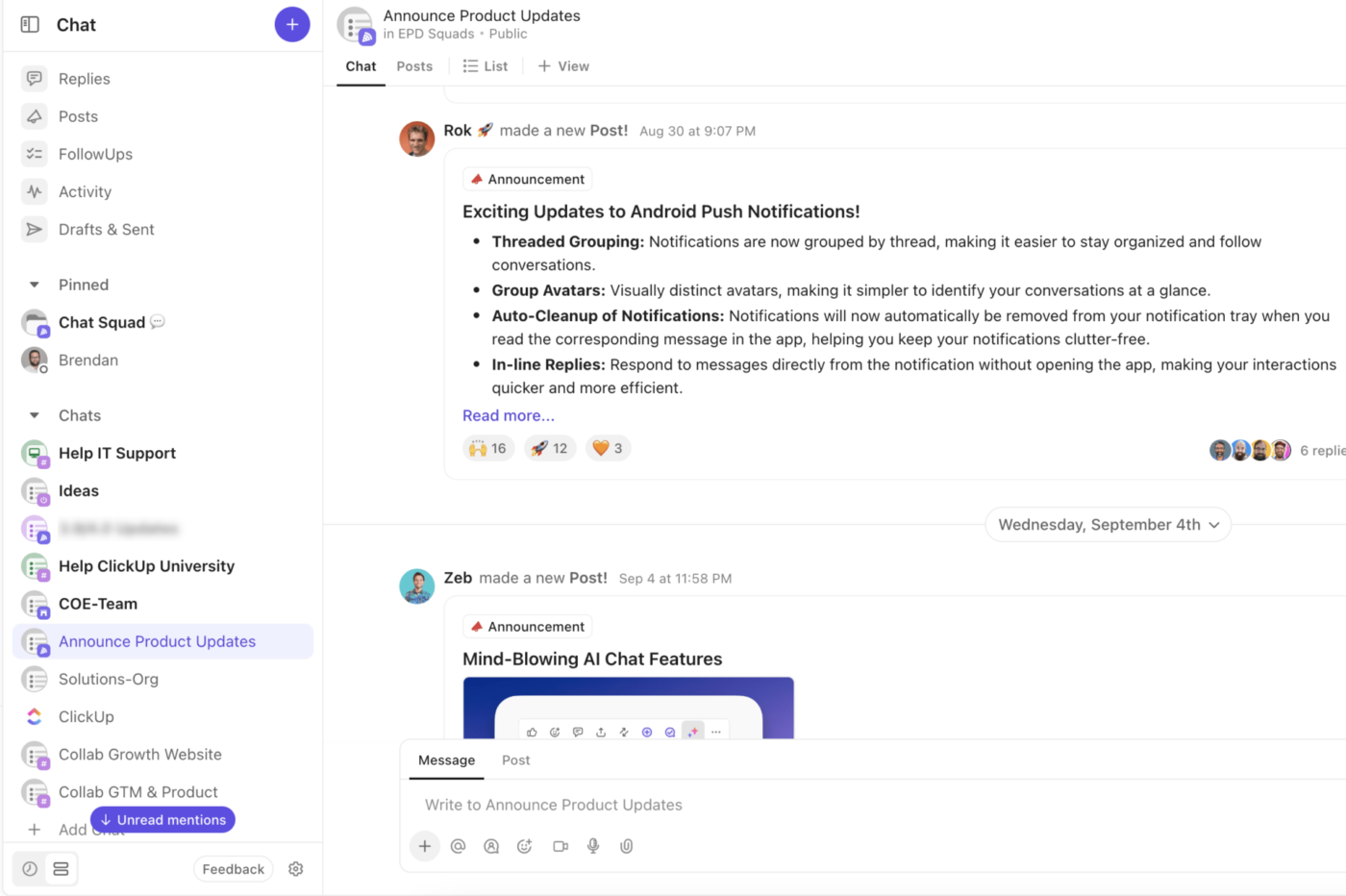
Enter ClickUp Chat, a communication tool built directly into ClickUp’s Project Management Software.
Unlike standalone chat platforms, Chat connects conversations with your work. Every chat lives where your tasks, lists, and documents exist, keeping everything in sync.

Planning a conference? Use ClickUp Chat to discuss venue options, link messages to tasks like securing contracts, and assign FollowUps to ensure team members take action. There’s no need to copy and paste or dig through scattered channels—everything stays tied to the right context.
SyncUps add even more value. These video and audio calls happen directly within chats, making it easy to jump on quick calls to review schedules, brainstorm ideas, or resolve last-minute issues without leaving your workspace.
🧠 Fun Fact: The Super Bowl halftime show is planned years in advance, with every second accounted for—including backup plans in case of power outages or weather issues.
Oversee event progress and KPIs with ClickUp Dashboards
ClickUp Dashboards provide an at-a-glance view of your event’s progress and key performance indicators (KPIs).
With 50+ customizable cards that display task status, budget tracking, and timeline progress, you can monitor real-time data and quickly identify areas that need attention.
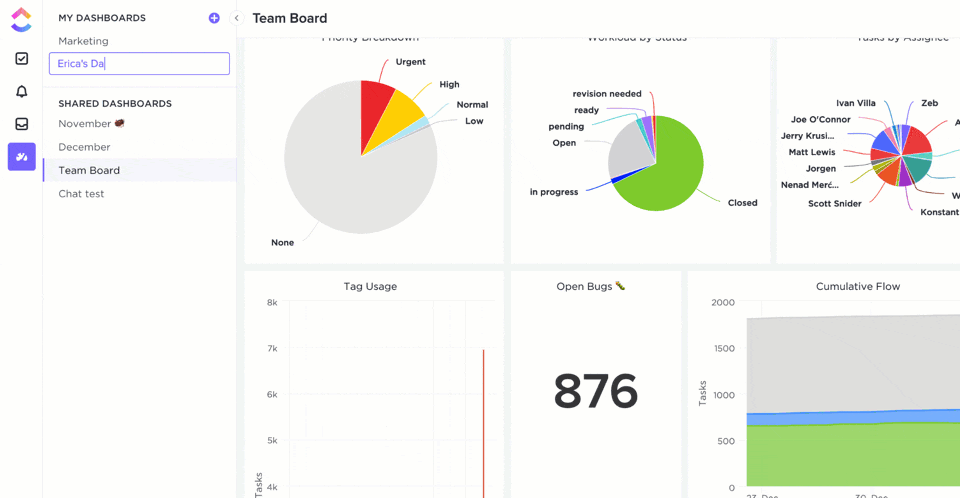
While managing a corporate conference, create a Dashboard to monitor speaker schedules, venue logistics, and marketing efforts. You can track task completion, manage last-minute adjustments, and ensure every detail is on schedule—keeping the entire team aligned.
Streamline repetitive tasks with ClickUp Automations
Automation reduces manual effort and minimizes errors, allowing the team to focus on more strategic aspects of event planning.
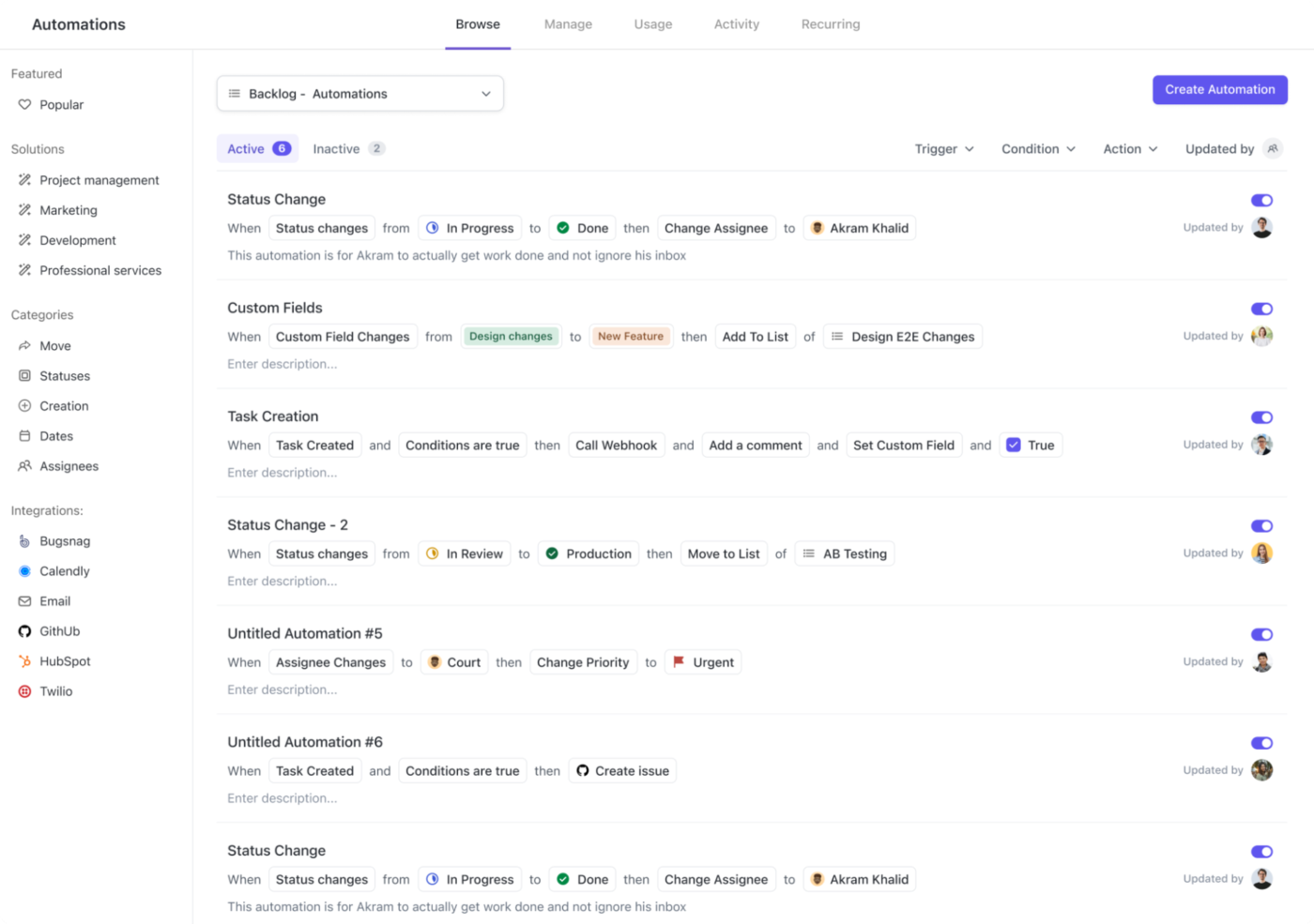
ClickUp Automations enables you to:
- Assign tasks effortlessly: Automatically assign venue booking or speaker coordination tasks to the right team member when a new task is created
- Track progress seamlessly: Update task statuses, such as moving ‘Vendor Contracts’ to ‘In Progress’ as soon as a due date is added
- Never miss a deadline: Send automatic reminders or notifications for important milestones like catering deadlines or AV setup dates
🔍 Did You Know? The Kumbh Mela in India is the largest human gathering, attracting over 100 million people in a single event.
Optimize workflow with ClickUp Integrations
ClickUp integrates with a range of third-party tools to create a seamless workflow. These integrations ensure that data flows smoothly between platforms, keeping everyone on a unified platform without the hassle of manual updates.

Here are some key ClickUp Integrations that can enhance your event management process:
- Google Calendar: Sync tasks and deadlines with your calendar to ensure nothing gets overlooked during event planning
- Google Drive: Attach contracts, presentations, or marketing materials directly to tasks for easy access during event preparation
- Eventbrite: Integrate attendee lists or ticketing information into tasks to track registrations and event logistics in one place
Leverage templates for quick event setup
ClickUp also offers extensive event planning templates to speed up every aspect of the process.
Here are some templates to try:
🔗 For larger projects and multi-day events, download the ClickUp Large Event Planning Template to coordinate logistics and manage schedules seamlessly
🔗 For budgeting and financial planning, apply the ClickUp Event Budget Template to track expenses, monitor costs, and stay within budget
🔗 For organizing travel-based event schedules, check out itinerary templates to create structured travel plans, daily schedules, and activity breakdowns
🔗 For structuring conferences and meetings, use conference agenda templates to plan speaker sessions, discussion panels, and break times effectively
Major Risks of Poor Event Project Management
Poor event project management can derail even the best ideas, leading to costly mistakes and a less-than-stellar attendee experience. These risks often stem from inadequate planning, poor communication, and a lack of contingency measures.
Let’s look at some examples:
- Budget overruns: Poor budgeting and cost control lead to exceeding allocated funds ❌
- Lost revenue: Low attendee turnout and sponsorship failures reduce profitability ❌
- Logistics issues: Inefficient venue management, coordination, and transportation can create bottlenecks ❌
- Technical failures: Unreliable technology, lack of backup systems, and inadequate support disrupt the event ❌
- Public perception damage: Major failures may harm the organization’s brand and credibility ❌
- Crowd control issues: Poor security and management can lead to accidents ❌
- Emergency response failures: Lack of preparedness for medical or security incidents can escalate crises ❌
- Regulatory non-compliance: Violating safety and legal requirements can result in fines and lawsuits ❌
🔍 Did You Know? Professional event planners often include ‘unicorn insurance’ in their contracts. It is a quirky industry term for covering truly unpredictable disruptions.
Event Project Management Best Practices
Successful event project management requires clear planning and proactive monitoring. Now that you know the risks, it’s easy to implement best practices, which is key to ensuring a smooth event and maintaining your organization’s credibility.
Here are some best practices for effective event project management:
- Assemble a dedicated team: Build a diverse group with expertise in planning, marketing, logistics, operations, and technical support ✅
- Prioritize the attendee experience: Design every element of the event to engage, comfort, and delight your audience ✅
- Communicate effectively: Maintain open channels with stakeholders—including team members, vendors, and attendees—to keep everyone aligned ✅
- Implement a strategic marketing plan: Reach your target audience and generate interest through focused promotion and clear messaging ✅
- Adopt an event planning checklist: Use a detailed checklist to consolidate all tasks and deliverables, ensuring nothing is overlooked ✅
Key event KPIs
Knowing which KPIs to track is the secret to understanding how your event really performed.
Let’s break down the key ones that deserve your attention.
- Budget adherence: Track actual spending against your planned budget to ensure financial efficiency
- Timeline compliance: Monitor task completion and milestone achievements to keep the project on schedule
- Attendance and engagement: Compare actual attendance with expected figures and assess engagement levels to measure event impact
- Financial metrics: Evaluate revenue, sponsorship success, and budget efficiency through:
- Revenue generated
- Sponsorship income
- Cost per attendee
- Budget variance
- Return on investment (ROI)
- Marketing KPIs: Assess promotional effectiveness through:
- Social media engagement
- Website traffic and lead generation
- Discount code usage
📖 Also Read: AI Tools for Smoother Event Management
Plan Big and Stress Less With ClickUp
Great event project management means blending creativity, organization, and adaptability to pull off something unforgettable.
Every detail counts, and as tech evolves and audience expectations shift, having the right tools ensures you’re always ready to deliver.
That’s where ClickUp comes into play—helping event planners ‘click’ all the right boxes with ClickUp Tasks for streamlined workflows, ClickUp Automations to save time, and ClickUp Chat for seamless communication.
From tracking budgets to managing last-minute changes, ClickUp keeps everything in sync.
Sign up to ClickUp today and focus on delivering unforgettable experiences!


